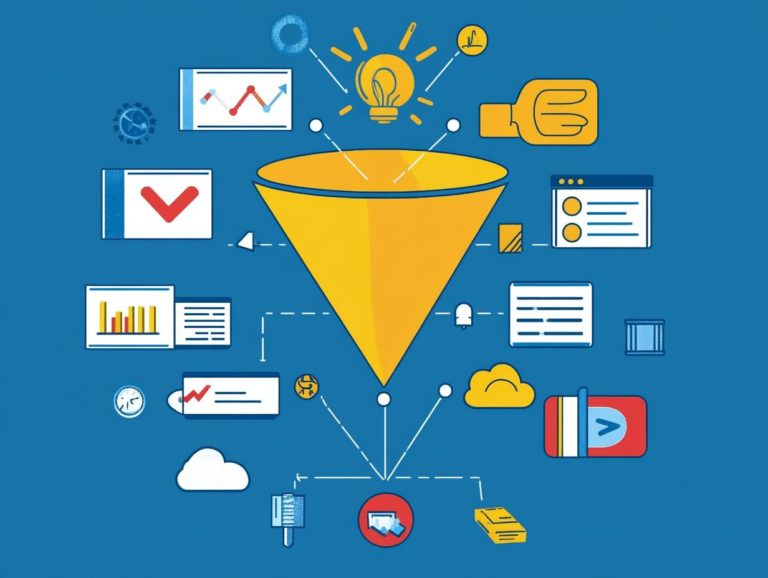Using Surveys to Generate B2C Leads
Let's Set Up Your Lead Generation Strategy
Fill out the form below, and our team will get in touch with you to create a tailored solution for your business.
In today s competitive landscape, grasping the nuances of your customers is more essential than ever. B2C leads are the lifeblood of your business. Surveys have emerged as a potent tool for uncovering valuable insights and forging meaningful connections.
Get ready to discover the game-changing role surveys can play in your B2C strategy! You ll learn how to craft effective questions and maximize response rates. It will also guide you through analyzing the data to identify and qualify potential leads. This allows you to create personalized marketing campaigns and measure success, ensuring your strategies remain agile and effective.
Dive in to unlock the full potential of surveys for your business growth.
Contents
- Key Takeaways:
- The Role of Surveys in Lead Generation
- Let's Set Up Your Lead Generation Strategy
- Designing Effective Surveys for Lead Generation
- Maximizing Survey Response Rates
- Let's Set Up Your Lead Generation Strategy
- Analyzing Survey Data for Lead Generation
- Using Survey Results for Targeted Marketing and Lead Generation Surveys
- Let's Set Up Your Lead Generation Strategy
- Measuring Success and Adjusting Strategies in Digital Marketing
- Let's Set Up Your Lead Generation Strategy
- Frequently Asked Questions on Lead Generation
- 1. How can I use surveys to generate B2C leads and improve my lead capture?
- 2. What type of questions should I include in my survey to generate B2C leads and enhance lead qualification?
- 3. Can I incentivize survey responses to increase B2C leads and drive customer engagement?
- 4. How can I ensure my survey is effective in generating B2C leads and improving customer satisfaction?
- 5. What are some best practices for using surveys to generate B2C leads and improve customer outreach?
- 6. Can I use surveys to gather feedback while also generating B2C leads and enhancing brand loyalty?
Key Takeaways:

- Utilize surveys to generate leads in the B2C market by providing valuable insights into consumer preferences and behaviors.
- Design effective surveys by including clear questions and incentives for participation, targeting specific demographics.
- Boost response rates by offering rewards, using multiple channels for distribution, and keeping surveys concise and easy to complete.
What are B2C Leads?
B2C leads represent potential customers who have expressed interest in products or services specifically designed for individual consumers rather than businesses. This type of lead generation is vital for B2C enterprises, as it directly influences the path customers take when deciding to buy and the sales pipeline. Ultimately, this impacts overall revenue and brand loyalty.
By understanding the origins of these leads and their interactions with digital marketing strategies, you can significantly enhance customer engagement and refine your marketing tactics.
The importance of B2C leads lies in their capacity to shape consumer behavior and preferences. This prompts companies to fine-tune their offerings. By analyzing the data collected during lead capture, you can uncover trends and insights that inform your future campaigns.
Implementing effective lead capture methods such as social media advertising, email marketing, and engaging content creates a seamless experience that resonates with potential customers. This approach drives higher conversion rates and builds trust, fostering long-term relationships where individuals feel valued and understood throughout their buying journey.
The Role of Surveys in Lead Generation
Surveys hold a crucial position in your lead generation efforts. They offer invaluable insights into the preferences, behaviors, and needs of potential customers. Surveys serve as a powerful tool for gathering customer feedback, refining your marketing strategies, and nurturing leads through tailored campaigns.
Incorporating surveys can help B2C businesses streamline lead capture and qualification processes. This ultimately enhances the overall customer experience.
Why Surveys are Effective for B2C Lead Generation
Surveys are exceptionally effective for B2C lead generation because they invite potential customers into a conversation. This approach allows you to gather valuable insights while cultivating a sense of community.
Engaging with interactive content doesn t just capture leads; it nurtures them by establishing trust and showcasing your commitment to understanding consumer needs. As a result, you significantly enhance customer engagement and improve your chances of conversion.
By tailoring your questions to address specific preferences and pain points, you can create a more personalized experience that resonates deeply with consumers. The feedback you collect from surveys enables you to adapt your offerings, enhancing both product development and marketing strategies.
These insights empower you to make informed decisions, demonstrating to consumers that their opinions truly matter. This, in turn, deepens those relationships. As your customers feel more valued, their willingness to engage with your brand grows, paving the way for increased loyalty and repeat business.
Start using surveys today to unlock insights that can skyrocket your business growth!
Let's Set Up Your Lead Generation Strategy
Fill out the form below, and our team will get in touch with you to create a tailored solution for your business.
Designing Effective Surveys for Lead Generation
Designing effective surveys for lead generation requires a strategic mindset. It prioritizes a deep understanding of your audience’s needs while fine-tuning your marketing funnels and incorporating lead magnets.
A well-constructed survey serves as a vital lead capture tool. It allows you to collect essential data that aids in lead qualification and enriches the overall customer experience through customer feedback.
Insights from these surveys elevate your promotional campaigns. They ensure your campaigns resonate with consumer preferences and drive greater engagement.
Key Elements and Best Practices

Key elements and best practices for creating effective surveys focus on setting clear objectives and writing clear questions. You should also select optimal response formats that encourage participation and facilitate lead qualification.
By incorporating elements like social proof and testimonials, you can enhance the credibility of your survey. This leads to improved customer satisfaction and engagement.
Using platforms that support interactive content significantly boosts response rates.
To engage participants, use a mix of question types such as multiple-choice, rating scales, and open-ended formats tailored to your audience’s preferences. This variety keeps respondents engaged and yields valuable insights.
Best practices recommend keeping your survey brief. Shorter surveys typically attract more responses and maintain participant interest. Testing the survey with a small group before wide distribution helps identify confusing elements, ensuring clarity and focus.
These strategies refine the survey experience and pave the way for meaningful feedback. This feedback drives future improvements in your promotional campaigns and branding strategies.
Maximizing Survey Response Rates
To maximize your survey response rates, employ strategic techniques that harness various channels. Use email marketing and social media platforms like TikTok to effectively connect with potential customers.
Engage leads through personalized outreach and offer enticing incentives, such as free samples or exclusive content like online courses. This greatly enhances participation rates.
Utilizing pop-ups on your website is also an effective method for capturing leads and driving engagement. They help create an online community.
Tips for Increasing Participation
To boost participation in your surveys, consider several effective strategies. Offer enticing incentives, keep surveys succinct, and clearly communicate the benefits of joining in.
Engage potential customers with interactive content and use social proof like video testimonials to enhance participation rates and improve your lead capture efforts.
Let's Set Up Your Lead Generation Strategy
Fill out the form below, and our team will get in touch with you to create a tailored solution for your business.
Creating a sense of urgency can motivate individuals to respond swiftly. This can be accomplished through limited-time offers or deadline reminders.
Additionally, segment your audience and personalize your invitations. This makes them feel more relevant and appealing.
Incorporating gamification elements, like progress bars or quizzes, transforms the survey experience into something enjoyable. This encourages users to complete the survey and share their experiences through social proof.
Following up with participants through thank-you notes or updates nurtures a sense of community and appreciation. This ultimately leads to higher engagement in future surveys.
Analyzing Survey Data for Lead Generation
Analyzing survey data for lead generation requires you to interpret responses effectively. Identify and qualify leads while refining your marketing strategies.
By examining customer feedback and behavioral patterns, you can optimize your sales pipeline and enhance your targeting efforts. This results in improved customer engagement and satisfaction.
Unlock the potential of your data to create powerful, tailored marketing campaigns that will engage your audience. Enhance your customer experience.
Identifying and Qualifying Leads
Identifying and qualifying leads from survey data is crucial for crafting targeted marketing strategies that resonate with customer needs.
Reviewing customer feedback helps you identify hot leads and those needing more attention. This optimizes your sales pipeline.
This approach allows for personalized communication that genuinely connects with potential customers, boosting overall engagement.
Employing various techniques like the study of customer feelings and trend identification enables you to pinpoint key characteristics of your ideal clients.
Segmenting based on survey responses lets you develop tailored follow-up strategies that address specific preferences and pain points.
This alignment between customer insights and sales tactics streamlines lead qualification and strengthens relationships. This ensures you deliver value with every interaction and build brand loyalty.
By consistently gathering and integrating feedback into your lead nurturing efforts, you create a dynamic sales process that evolves alongside customer expectations.
Using Survey Results for Targeted Marketing and Lead Generation Surveys

Let's Set Up Your Lead Generation Strategy
Fill out the form below, and our team will get in touch with you to create a tailored solution for your business.
Utilizing survey results for targeted marketing gives you the power to craft personalized campaigns that cater to the distinct needs and preferences of your customer base.
By seamlessly integrating insights from surveys into your marketing strategies, you can significantly enhance customer engagement and satisfaction.
This, in turn, paves the way for higher conversion rates and fosters brand loyalty. Embracing this data-driven approach enables your brand to resonate more profoundly with your audience, ensuring that your messages hit the mark.
Creating Personalized Campaigns Based on Survey Data and Customer Behavior
Creating personalized campaigns based on survey data means segmenting your audiences creatively and tailoring your messaging to resonate with their specific interests.
By harnessing insights from customer behavior and preferences revealed through surveys, you can significantly enhance engagement and cultivate loyalty.
This targeted approach amplifies the effectiveness of your marketing campaigns and drives higher conversion rates.
To kick things off, it s essential to define clear segmentation strategies that focus on various demographics, psychographics, and purchasing behaviors.
Understanding what motivates your consumers gives you the ability to craft messages that speak directly to their needs and desires.
By continuously analyzing survey results and feedback, you can refine your approach, ensuring that your messages stay relevant and impactful.
This iterative process of gathering data and adjusting your campaigns fosters a dynamically marketing environment, where customer voices shape the brand narrative.
Measuring Success and Adjusting Strategies in Digital Marketing
Measuring success and refining strategies in survey-based lead generation is essential for enhancing marketing efforts and elevating customer experiences.
By assessing important metrics that help you measure success like response rates and conversion rates, you can identify areas needing improvement and modify your tactics accordingly.
This iterative process guarantees that your marketing strategies stay in tune with customer preferences and market trends, ultimately fostering sustained growth.
Evaluating the Effectiveness of Survey-Based Lead Generation and Marketing Strategies
Evaluating the effectiveness of your survey-based lead generation involves assessing how well these initiatives align with your overall marketing strategies and business objectives. Analyzing the impact of surveys on lead quality and how many people take action after the survey can help refine your approaches and enhance future campaigns.
This evaluation deepens your understanding of customer behavior and helps you tailor upcoming surveys for maximum effectiveness.
Let's Set Up Your Lead Generation Strategy
Fill out the form below, and our team will get in touch with you to create a tailored solution for your business.
To achieve this, focus on key metrics such as response rates, information about who your audience is, and engagement levels. Implementing testing two versions allows you to compare different survey formats to see which performs better.
Tracking post-survey actions like how leads progress through the sales funnel provides valuable data on conversion efficiency.
Qualitative feedback from participants can also uncover insights about customer preferences and pain points. By synthesizing these findings, you can create more targeted marketing strategies that resonate deeply with your audience, ultimately leading to improved return on investment (ROI) and sustained growth.
Frequently Asked Questions on Lead Generation
1. How can I use surveys to generate B2C leads and improve my lead capture?

Surveys can generate B2C leads by asking questions that interest your audience and promoting them through various channels, such as social media, email marketing, or your website.
2. What type of questions should I include in my survey to generate B2C leads and enhance lead qualification?
Include relevant questions about your target audience’s interests, demographics, preferences, and pain points to help identify potential leads.
3. Can I incentivize survey responses to increase B2C leads and drive customer engagement?
Yes, offering an incentive, like a discount or free product, can motivate people to participate in your survey and increase your chances of generating B2C leads.
4. How can I ensure my survey is effective in generating B2C leads and improving customer satisfaction?
Ensure your survey is well-designed, easy to understand, and includes relevant questions. Make sure to ask a question at the end of your survey to encourage respondents to take further action, such as signing up for your newsletter or following your social media accounts.
5. What are some best practices for using surveys to generate B2C leads and improve customer outreach?
Best practices include targeting the right audience, keeping your survey short and concise, and promoting it through multiple channels. Follow up with leads and track your survey’s performance to improve future surveys.
6. Can I use surveys to gather feedback while also generating B2C leads and enhancing brand loyalty?
Yes, you can use surveys to gather feedback and generate B2C leads. Make sure to ask respondents if they would like to receive updates or offers from your company, and provide an option for them to leave their contact information.






